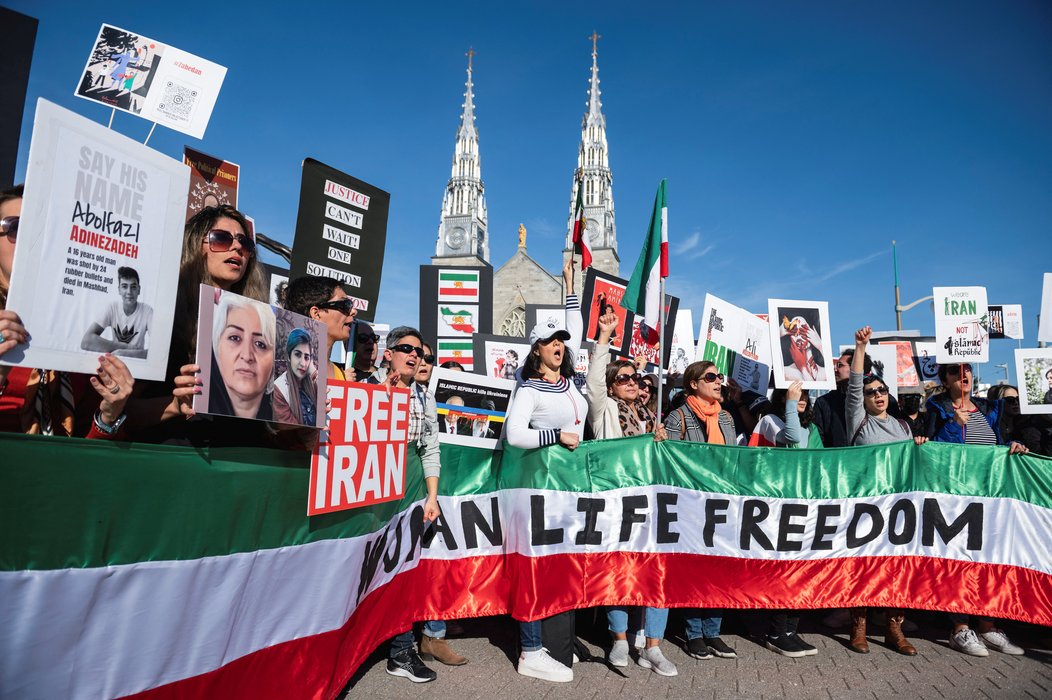
General update
On 16th July 2024, CIVICUS and the Gulf Centre for Human Rights (GCHR) made a joint submission to the UN Universal Periodic Review on the situation of Iran’s civic space. Specifically, it analyses Iran’s fulfilment of the rights to freedoms of association, expression and peaceful assembly and unwarranted restrictions on human rights defenders since its previous UPR examination in November 2019.
The submission raised concerns about the systematic misuse of the criminal justice system to punish and retaliate against human rights defenders, journalists and protesters, including through the use of the death penalty to punish and deter peaceful human rights work. It raises further concerns about the criminalisation of advocacy for women’s rights and gender equality, characterised by systematic targeting and imprisoning of women human rights defenders in repeated cycles of criminal litigation, including through the continuous filing of additional charges against those already serving lengthy prison sentences in retaliation for their peaceful human rights activities. Additionally, although the constitution guarantees the right to form trade unions, Iranian authorities do not permit the creation of labour unions, allowing only state-sponsored labour councils. Labour rights groups continue to face escalating pressure, with prominent leaders and activists being imprisoned under national security charges. A stark example occurred in June 2023, when labour activist Davood Razavi received a five-year discretionary prison sentence for organising protests advocating for better wages and improved working conditions. Additionally, Razavi was banned for two years from participating in political parties, groups, or online activities.
Expression
On 2nd September 2024, UN experts expressed alarm over a surge in executions during the month of August 2024 and urged the Islamic Republic of Iran to immediately stop the execution of people facing the death penalty. According to the UN experts’ press release, at least 81 individuals were executed in August, twice as many as the 45 executions reported in July. The reported number of executions this year has risen to above 400 individuals, among them 15 women.
The UN experts expressed their view that trials of individuals who have been executed—including for murder—had failed to observe due process guarantees. Reza (Gholamreza) Rasaei, a Kurdish protester of the Yarsani faith, was executed on 6th August at Dizel Abad prison. Based on a confession reportedly obtained through torture, Rasaei was sentenced to death for allegedly murdering an Islamic Revolution Guards Corps member while at a ceremony for a Yarsani leader and musician, holding “Woman, Life, Freedom” signs. The Supreme Court confirmed his death sentence despite co-defendants retracting their testimonies about Rasaei’s involvement in the murder, and despite a forensic medical examiner providing testimony challenging Rasaei’s involvement in the murder.
The UN experts noted that numerous individuals are facing the death penalty for a range of offences, including broadly defined security offences such as armed rebellion, spreading corruption on earth, waging war against God, and apostasy.
On 5th September 2024, the Nobel Peace Centre held an event to promote women’s rights. The Nobel Peace Centre also called for support from people to help free the 2023 Nobel laureate Narges Mohammedi through a video with prominent supporters. Mohammedi has been injured in prison recently after being beaten by guards for staging a protest with other prisoners against the death penalty for Rasaei and others. Two women, Kurdish journalist Pakhshan Azizi and women’s rights activist Sharifeh Mohammadi, have been sentenced to death. The Center for Human Rights in Iran (CHRI) said multiple women political prisoners are at risk of executions based on “sham charges”.
As the second anniversary of the "Woman, Life, Freedom" protests approaches, human rights organisations continue to place the spotlight on the cases of WHRDs and other civil society actors suffering retaliation for their peaceful human rights work. One such case to highlight is that of imprisoned children's rights activist, social worker, translator and women's rights advocate Sarvenaz Ahmadi. In addition to her activism, Sarvenaz Ahmadi is also the translator of the book "Revolution at Point Zero: Housework, Reproduction, and Feminist Struggle" by Silvia Federici. On 6th November 2022, during the "Woman, Life, Freedom" protests, just three weeks into her marriage with Kamyar Fakoor, she and her husband were both arrested. She was placed in solitary confinement in Ward 209 of Evin Prison and temporarily released from Evin Prison one month later. Branch 15 of the Tehran Revolutionary Court, led by Judge Salavati, sentenced Sarvenaz to six years in prison on charges of "spreading of propaganda against the state" and "collusion and conspiracy to commit crimes against national security," which was later reduced to three years and six months in Branch 36 of the appeals court. On 28th April 2023, on the eve of Teacher's Day, while visiting the home of Mohammad Habibi, a detained teacher, along with a group of other civil rights activists, Sarvenaz Ahmadi was re-arrested. Ultimately, she was sent to the Women's Ward of Evin Prison to serve her sentence. Despite her case becoming eligible for amnesty according to the judicial system, her sentence was carried out.
On 18th July 2024, Amnesty International reported that rapper Toomaj Salehi is arbitrarily detained in Esfahan central prison, Esfahan province, in relation to his peaceful activities, including participation in the “Woman, Life, Freedom” uprising and social media posts critical of the Iranian authorities. In June 2024, the Supreme Court overturned his conviction and death sentence, and sent the case to a lower court. He is also facing new spurious charges in separate proceedings solely for peacefully exercising his human rights, including freedom of expression through his music.